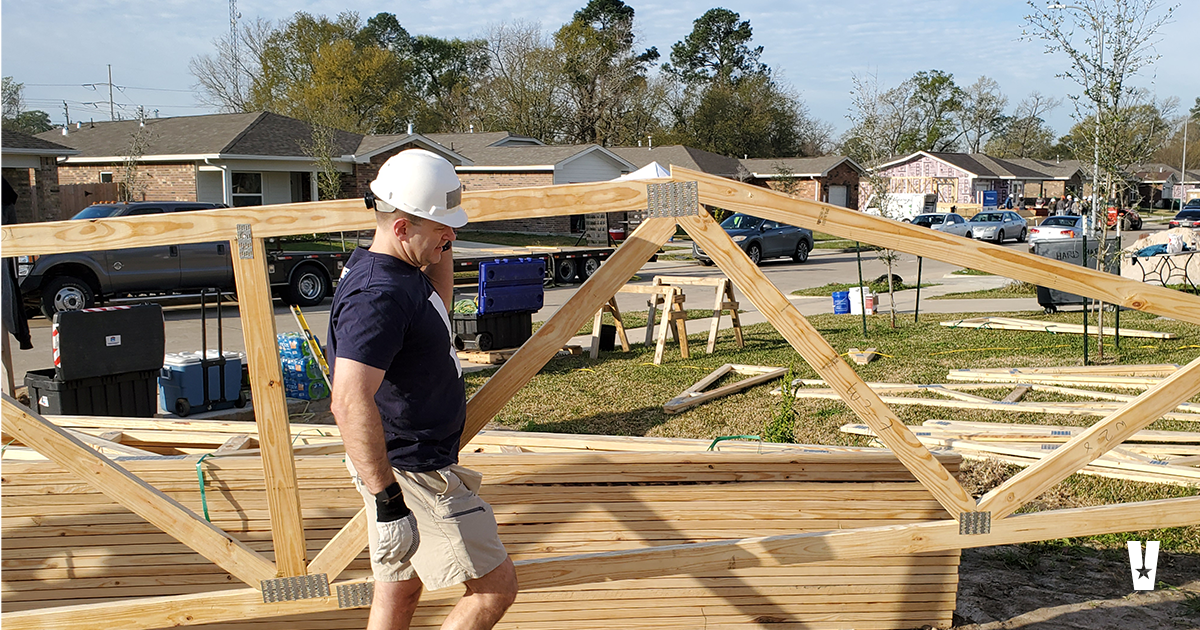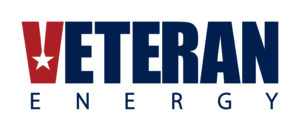
As part of Veteran Energy’s mission to Support Our Heroes, we give back a portion of each customer’s bill to trusted military and veteran organizations. Sometimes, customers decide to funnel their contributions to a general fund instead of choosing a specific organization. These dollars are used to fulfill requests we get throughout the year to support great community causes.
Read on to learn more about the latest organization we’re proud to sponsor through this program: Houston Habitat for Humanity.
Toward the end of last year, Houston Habitat for Humanity approached Veteran Energy about sponsoring a veteran home build, and we were excited to take part. The organization, which has had a veteran build program in the works for the last seven years, is able to build or help renovate homes for about 20 veterans each year. We were able to give $70,000 to the effort, and the home is now nearing completion.
Last week, we caught up with Houston Habitat for Humanity Executive Director Allison Hay to learn more about their Veteran Build program and how they’re coping with COVID-19.
“We see veterans here as hard-working Houstonians,” Hay said. “But many aren’t at the wage levels that would allow them to pay that 20% down payment to get into a home.”
Hay said Houston, through outreach and temporary housing programs, has done a great job of helping end veteran homelessness in the city. And that’s no small feat, she said, considering the city’s 282,000 veterans—about 1/5 of the state’s total veteran population. But what happens when those veterans, many with families and children to support, are ready to move out of that housing?
“We’re uniquely positioned to provide veterans the opportunity to build their financial foundations, so they aren’t paying increasing rents or buying a mortgage that leaves them cost burdened,” she said. “Instead, they can work to build a community and their homes alongside volunteers who love our service members.”
The process begins with filling out an online application, she said. Then the group’s board meets to discuss and vote on the most qualified candidates. Applicants are usually contacted within a month.
For a new home, they have to demonstrate a need, Hay said. They need to be able to show that they’re having trouble paying their rent amount. Or they need to be able to show they’re in unsafe or crowded living conditions—something even more of a concern in the face of COVID-19.
They have to also be willing to partner in building the home, she said. They have to be U.S. citizens employed for at least a year, and they must show they’ll be able to pay their mortgage once they’re in the new house.
Once approved, selected veterans are usually in their new homes between six months and a year—for those just seeking repairs done to a home they already own, work often starts within a few weeks.
“These are people who served our country. They deserve a way to gain wealth, and homeownership is the way to do that,” she said, adding that these builds present the first opportunity for many veterans to do that.
“We had a 70-year-old veteran we put in a home last year,” she said. “He’d never been a homeowner, though it was one of his lifelong goals.”
But despite all the feel-good stories, there are challenges, especially in light of the current pandemic. Houston Habitat for Humanity has had to find new ways to do what they do. Current work on homes has slowed a little, Hay said, as, in the interest of safe distancing, they’ve had to cut the number of volunteers allowed on build sites. They’ve had to seek grants for sanitizing stations for tools, and they’ve had to purchase face masks and face shields for volunteers.
Those who work directly for the organization have been working remotely, she said, though they’ve had some practice in the past with that in the wake of natural disasters such as hurricanes. And they’ve been able to successfully phase into virtual information sessions and classes—something she said is an advantage to veterans who lack transportation. “We now have the ability to present our program virtually to a lot more people,” she said. And at the beginning of August, the group will implement changes to its online application to make it even easier for veterans to get services.
Additionally, Houston Habitat for Humanity is seeking to put together a core group of volunteers, Hay said, as COVID-19 has shown them they need to rely on smaller, well-trained groups that can show up for multiple builds. But for now, volunteer training has paused. They hope to get it going again in the fall.
Veteran Energy is proud to sponsor Houston Habitat for Humanity’s Veteran Build program. If you’re interested in being one of the group’s core volunteers when the program resumes, or if you’re a Houston veteran looking to get into a new home or have repairs done, visit their site here.


